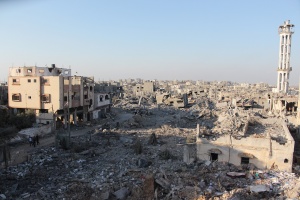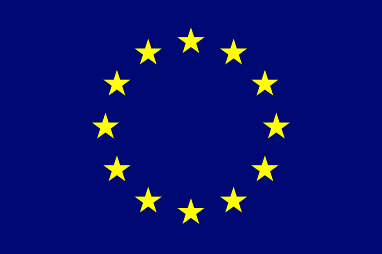Gaza: humanitarian crisis situation and VOICE members' statements

First published 13/10/2023
Updated 19 September 2024
Almost one year into the escalation of the Gaza crisis, the humanitarian situation has deteriorated to unprecedented levels. Continuous bombardments and ground operations by Israeli forces across Gaza, coupled with severe access restrictions, have left civilians in dire conditions, creating acute humanitarian needs and violations of International Humanitarian Law.
As of September 2024, the fatality toll among Palestinians has surpassed 40,000, with over 95,000 people injured, according to the Ministry of Health in Gaza. Among the fatalities, over 11,000 are children, with thousands more suffering life-changing injuries.
Violations of International Humanitarian Law (IHL) and attacks on civilians
Since October 2023, Israeli military operations have consistently targeted civilian infrastructure, including health facilities, homes, and schools. Repeated airstrikes on so-called "humanitarian zones" have killed thousands of civilians, including women, children, and the elderly. Several hospitals in Gaza are no longer functional, forcing medical facilities to operate with shortages of over 70% of critical medical items. The destruction of vital infrastructure, including water systems and power grids, has exacerbated the public health crisis, leaving millions without access to clean water and electricity.
Forced displacement and mass evacuation orders have further worsened the humanitarian crisis. These forced evacuations have often occurred with little warning, depriving civilians of safe refuge and violating IHL. Additionally, humanitarian organisations and medical workers have repeatedly come under attack, with almost 300 aid workers killed since the start of the conflict.
Humanitarian access and aid obstruction
The systematic obstruction of humanitarian aid has drastically reduced the entry of life-saving supplies. 83% of essential food aid has been blocked, leaving nearly half a million people, including tens of thousands of children, at risk of starvation.
The Rafah crossing, which briefly opened earlier in the year for limited evacuations, remains closed, exacerbating the fuel and aid delivery crisis across Gaza. Repeated delays and denials of access have severely limited the ability of humanitarian organisations to reach those in need.
Calls for ceasefire and humanitarian support
Humanitarian organisations and international actors have continuously called for an immediate ceasefire and unfettered humanitarian aid access. Recent joint press releases from humanitarian NGOs, including VOICE members, have condemned Israel’s actions, calling for an end to the blockade and the establishment of safe humanitarian corridors.
Member and VOICE’s articles and reactions
-
VOICE Statement - Gaza one year on, the loss of life must end
- Joint press release: Israel’s siege now blocks 83% of food aid reaching Gaza, new data reveals
- Joint statement: Aid agencies and medical professionals warn of dangers of a mass polio outbreak without urgent action, endangering a generation of children
- Oxfam: More women and children killed in Gaza by Israeli military than any other recent conflict in a single year
Previous Updates
On 7 October 2023, Palestinian armed groups launched an attack on Israel attacking Israeli forces as well as civilians and civilian infrastructure and towns. Afterwards, Israeli authorities launched an attack on the Gaza Strip which increased a dire humanitarian situation for a population that was already living in a humanitarian crisis.
Due to the siege imposed by Israel, the residents of the Gaza Strip have no electricity or fuel supplies. Access to drinking water has been interrupted as the water supply system has been damaged by air strikes. As a result, health facilities are completely overwhelmed, and access to them is hampered by the conflict and damaged roads.
On 13 October, Israel issued an ultimatum on Gaza residents to evacuate to Southern Gaza within 24 hours. Meaning that 1.2 million civilians would have to evacuate their homes in just a few hours. This ultimatum of forcible transfer is contrary to international humanitarian law.
On 16 October, following the escalation of the conflict, the European Commission announced an immediate increase of the humanitarian aid envelope for Gaza to a total of over 75 million euros. At the same time, to facilitate the delivery of aid in Gaza, the Commission launched an EU Humanitarian Air Bridge that will help bring supplies in Egypt to be delivered in Gaza by humanitarian organisations.
On 17 October, Al Ahli Arab Hospital in Gaza was targeted by a strike, reportedly killing hundreds of patients and civilians seeking shelter from the ongoing conflict. This represents a new deliberate breach of international humanitarian law at a moment at which the number of casualties reached 4,300 since the escalation of the conflict.
Calls for an immediate ceasefire and to let aid into Gaza through humanitarian corridors have not stopped growing in the last few days, as the situation in the Gaza Strip has become even more severe. On 19 October, an airstrike hit the grounds of Saint-Porphyry Church in Gaza, where hundreds of civilians were taking refuge. At least 17 were killed, including a Caritas colleague who lost her life.
On 21 October, the Rafah crossing between Gaza and Egypt opened for the first time since 8 October. However, the amount of goods that crossed the border is equivalent to about four percent of the average of those imports before the escalation of the conflict. This makes it imperative to increase the access of aid to cope with the needs of the affected populations.
As access of aid remains highly limited through the Rafah crossing, water, food, and fuel supplies among others are running out. UNRWA, the largest humanitarian provider in Gaza, alerted that they will be forced to halt their operations unless fuel is allowed inside Gaza immediately. In sight of the distressing situation in Gaza, calls for a ceasefire continue mounting, not only among NGOs but also within the EU and UN.
On 1 November, the Rafah Crossing between Gaza and Egypt opened for the movement of people, allowing the evacuation of wounded Palestinians and foreign passport holders. However, the entry of fuel is still banned by the Israeli authorities, which is pushing hospitals to halt their operations as they run out of fuel, such as the Turkish-Palestinian Friendship hospital in Gaza, which has been forced to stop most of its activities.
Due to the advance of the Israeli offensive, Gaza city has been cut off from northern Gaza, impeding the delivery of humanitarian aid from the south to about 300,000 internally displaced persons (IDPs).
One month after the hostilities started in Gaza, the fatality toll has surpassed 10,000, including 4,008 children and 2,550 women, according to the Ministry of Health in Gaza. At the same time, the number of internally displaced people is about 1.5 million people, which is generating a deteriorating sanitary situation due to overcrowded spaces.
As a result of the lack of power, medical consumables, oxygen, food and water, most hospitals in Gaza cannot operate normally any longer. As of 14 November, 22 out of 36 hospitals in Gaza were non-functional, while only one of the hospitals in Gaza city and northern Gaza, the worst affected area, remain operational at a minimum level. Fuel shortages are also gravely impacting the distribution of aid and the operation of data centres from telecommunication companies.
The situation of health facilities remains critical as the only three functional hospitals in Northern Gaza keep being attacked by Israeli forces. On 22 November, almost 200 wounded and sick people were evacuated from Shifa Hospital to health facilities in the south. Some 250 patients and staff members are estimated to remain at Shifa, which is no longer operational. In the south, 7 facilities out of a total of 11 are still functional, while only one hospital has the capacity to treat critical trauma cases or perform complex surgery.
After a ceasefire that has come to an end, 7 December marks two months since the conflict started in Gaza. The UN Secretary-General has called for a humanitarian ceasefire, citing a risk of a collapse in the humanitarian system. Aid distributions are impaired, and tens of thousands of internally displaced persons have arrived in Rafah. Concerns are raised about limited healthcare access and a worsening hunger crisis, with the World Food Programme warning that renewed fighting endangers aid distribution and humanitarian workers' lives.
Other member’s articles and reactions
In response to the situation, several VOICE members have issued statements asking to put an end to the hostilities and to respect international humanitarian law:
- Statement by Principals of the Inter-Agency Standing Committee: Humanitarian chiefs will not take part in unilateral proposals to create “safe zones” in Gaza (cosigned by CARE International, Mercy Corps, and Save the Children, among others)
JOINT APPEAL: Not enough water to survive – Urgent appeal from WASH actors in the occupied Palestinian territory (Action Against Hunger, NRC, Oxfam, WeWorld, CARE) - JOINT PETITION: #CeasefireNow: Open Call for an Immediate Ceasefire in the Gaza Strip and Israel
- JOINT STATEMENT (Action Against Hunger, Humanity & Inclusion, Médecins du Monde, Mercy Corps, Norwegian Refugee Council, Oxfam International, Plan International, Save the Children): Urgent plea to avert unprecedented humanitarian crisis amid looming Israeli land incursion into Gaza
- IASC JOINT STATEMENT (Including CARE International, Mercy Corps, Save the Children): "We need an immediate humanitarian ceasefire", Statement by Principals of the Inter-Agency Standing Committee, on the situation in Israel and the Occupied Palestinian Territory
- NGO Action News – Recent and upcoming activities of Civil Society Organizations working on the question of Palestine (23/11/2023)
- Action Against Hunger: Action Against Hunger Condemns Violence in Israel and Gaza
- Alianza por la solidaridad: Es urgente un corredor humanitario en Gaza
- CARE: Israel-Gaza Conflict: Atrocities against civilians can be the worst seen in decades
Gaza: After two months of war, women last to eat and children first to die - Caritas Internationalis: Caritas Jerusalem urges international community to halt the ongoing violence in the Holy Land
- DanChurchAid: “THE INTERNATIONAL COMMUNITY MUST PUSH FOR A HUMANITARIAN CORRIDOR INTO GAZA”
- Danish Refugee Council: DRC statement on the escalation of violence in Israel/Palestine
- Goal Global: In wake of dramatic escalation of violence and loss of civilian life in Israel and Gaza, GOAL mounts humanitarian aid scoping mission in Lebanon
- HI: No safe place in Gaza: Khan Younis is uninhabitable
- International Rescue Committee: The IRC warns of catastrophic humanitarian consequences if violence continues, calls for upholding of International Humanitarian Law
- International Rescue Committee: Gaza UN Resolution Must be Turned into Action on the Ground
-
INTERSOS: Statement on the situation in Israel and the Occupied Palestinian Territory
- Médecins du Monde: Evacuation d’1 million de personnes de la bande de Gaza : MdM dénonce une demande irréaliste
- Mercy Corps: Mercy Corps Urges Humanitarian Corridor into Gaza Amid Looming Water Shortage
- NRC: Israeli ultimatum to Gaza must be reversed
- Oxfam : Reaction: Israeli government’s order for the entire population of northern Gaza to evacuate
- Plan International: Escalation of violence in Israel and Gaza
Suffering and killing in Gaza must stop now - Polish Humanitarian Action (PAH): Statement regarding the humanitarian situation in the Gaza Strip
- Première Urgence Internationale: Gaza: new ultimatum puts more than a million civilians at risk
- Save the Children: CEO calls for the protection of children in Israel and the Occupied Palestinian Territory
- Secours Islamique: Urgence Gaza – Aide Humanitaire - Un embrasement sans précédent
- SOS Children’s Villages: Call for immediate protection of children and their rights in the Gaza Strip and Israel
- Terre des Hommes: Urgent Humanitarian Appeal to the International Community following the Evacuation Warning in Northern and Central Gaza
- Trócaire: Standing for Peace: Trócaire’s Statement on the Crisis in Israel and Palestine
- War Child: War Child calls for immediate ceasefire
- WeWorld: Israeli evacuation order must be revoked – GAZA under siege
- WeWorld: Nowhere to escape in Gaza. The war turned the humanitarian crisis into a catastrophe

